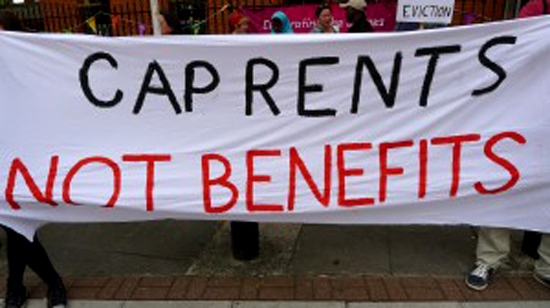
On 20 June, High Court judge Mr Justice Collins ruled that the reduced Overall Benefit Cap (OBC) is discriminatory against single parents with children under two years of age, stating that as a result of the reduction, ‘real misery is caused to no good purpose’. The reduction, from £26,000 to £23,000 a year for families living in London and to £20,000 a year for those outside, which came into effect from November 2016, has hit 68,000 families, including 200,000 children. They are among the poorest working class families in Britain, and they will face homelessness in the coming months because the resultant cut in housing benefit – on average £58 per week – will leave them unable to pay their rent. Already 11 families in Edinburgh have been evicted as a direct result of the measure; there will be many more such cases which have not yet been reported.
Over three-quarters of families now hit by the benefit cap are single-parent; although the government said it could not provide current figures for the proportion of single-parent families with children under the age of two, it was 16% under the initial £26,000 benefit cap. Under Department for Work and Pensions rules, parents with children under two are not obliged to show that they are actively seeking work. It was this that formed one of the bases of appeal against the benefit cap, as single parents would be exempt from the cap if they were working more than 16 hours a week.
The case against the benefit cap for lone parents with children under two was that it is both ‘unlawful discrimination’ and an ‘unreasonable failure’ to make an exemption. These grounds of complaint were carried against the government by the judge. The government argued that neither the children of lone parents under two, nor the parents of children under two are separate cohorts that could be discriminated against, since they are not permanent categories like the disabled: children will grow up and the parents may find partners. However, the government contradicted itself, on the one hand saying that the reduced benefit cap is not ‘an action concerning children’, but on the other hand that ‘it is in the children’s best interests because their life chances are improved through having their parents in work’.
The government lawyers made reference on several occasions to financial support and childcare schemes that do not actually exist, and failed to acknowledge that childcare costs for the under-three age group is not as available and is higher priced than childcare for three year olds and above. We are talking here of babies, toddlers and breast-fed infants. The government showed total ignorance about the realities of life for the parents of young children and no recognition of the numbers of children involved and the impact of the legislation.
In order to resolve this contradiction, the government argued that it is not in breach of the United Nations Convention on the Rights of the Child (UNCRC), adding ‘and even if there was a breach, that would not undermine the lawfulness of the Benefit Cap in the domestic legal sphere’. However, the bulk of the government argument was that ‘the 2016 Act was considered, intensively debated and approved by both Houses of Parliament’ and that ‘the democratic process is liable to be subverted if, on a question of moral and political judgement, opponents of the Act achieve through the courts what they could not achieve in Parliament’.
This case and these words should be a warning to all who are fighting against injustice. The parliamentary road is a limited way forward, as is the judicial route. The ruling, while welcome, affects only a small minority of the 68,000 families. The government will in any case appeal, and there will be no relief for the present. It shows that independent organisation and agitation must be continuous. In parliament, Labour did not oppose the original benefit cap, nor its subsequent reduction. There was no reference to it in its Manifesto for the general election campaign. It is now allegedly considering whether to oppose the measure – too late for many thousands of working class families living in despair.
The government case for the existing OBC was made in court with these words: ‘The benefit cap must not be considered in isolation. The benefit cap forms part of the Government’s welfare reform measures and deficit reduction measures in its ambition to move this country from a low-wage, high tax and high-welfare society, to a higher-wage, lower tax and less welfare-reliant one.’
This could equally have come from any previous Labour government. Let us strive for a country that does not expect the duty of care for infants and children, all of us, to be pushed aside for the purposes of tax relief and dividend payments to the rich.




